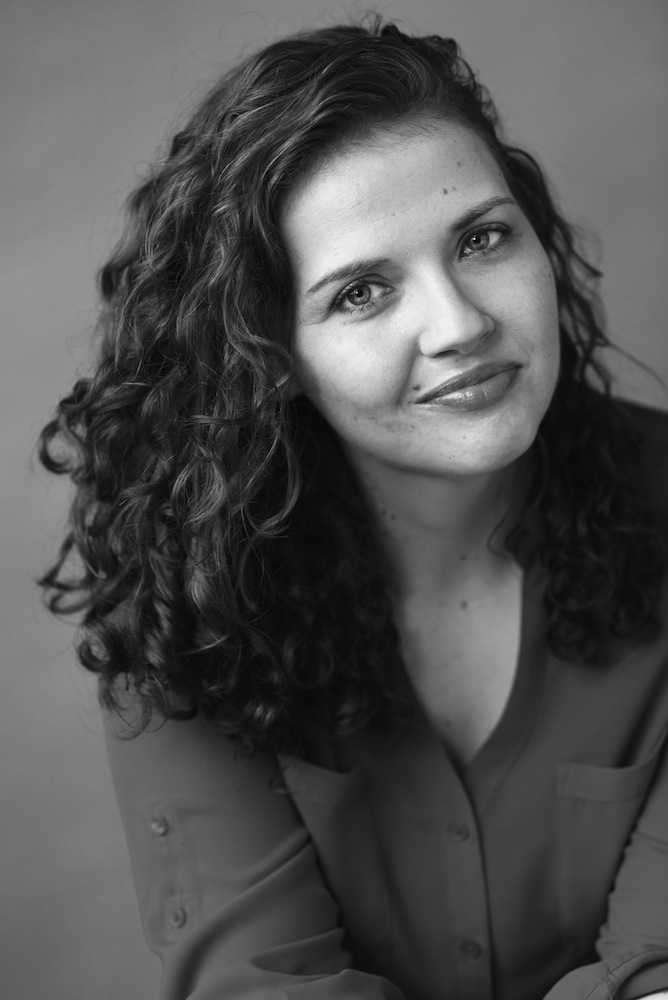Rebel Yell

KAYLA RAE WHITAKER. PHOTO COURTESY OF MARK BENNINGTON.
The Animators (Random House), the compelling debut novel from Kayla Rae Whitaker, has already drawn comparisons to feminist classics such as Thelma and Louise. But comparisons with other stories based on gender alone don’t come close to doing this novel justice.
Set between present day New York—including Manhattan and a gentrifying Bushwick—and Kentucky, The Animators follows Sharon Kisses and Mel Vaught, a creative team specializing in edgy, confrontational animation. Polar opposites, Sharon and Mel meet during their first week of college and are united by their love of art. While Sharon is quiet and insular, Mel is a wildly charismatic, gay, party-starter with a tumultuous past. They graduate, move to New York, and spend a decade persevering, creating, and becoming closer than sisters. When success does finally come, personal demons, tragedy, love, and the pressure to repeat it all combine to create a riveting tale familiar to anyone who has ever rebelled in the name of art.
Whitaker, a Kentucky native who is currently based in Louisville, received her MFA from NYU. Though not an animator herself, Whitaker has experienced some of the issues that face her characters. If The Animators is proof of anything, it is that her struggle wasn’t in vain.
JEFF VASISHTA: This novel reaches in and grabs you by your intestines and doesn’t let go. Where did it come from?
KAYLA RAE WHITAKER: I wanted to write the kind of book I wanted to read: a story about women making something, obsessively and lovingly. I wanted the heroines, Mel and Sharon, to have a sense of agency over their lives, and that’s something that I think is missing in a lot of narratives about women. There’s a lot of Mel and Sharon that is living in response to a lifetime of conditioning as girls, in which they were trained to desire and expect less. They fight back by being loud, spastic, and joyful—things little girls are expressly trained to not be. To see women throw their fists in the face of that conditioning is exhilarating.
VASISHTA: I loved the line when Sharon looks at herself in the mirror in hospital and thinks, “I’m totally unfuckable.” You have such a knack of putting down exactly how people think. It’s not an easy thing to pull off, especially for some writers who have studied the craft so extensively. In a way it involves forgetting a lot of what you’ve learned. Does that style of writing—not overly descriptive or lyrical—come naturally?
WHITAKER: Yes, but not without editing and care. If I have a choice between something that reads gracefully, yet is somewhat calculated, and something that is a bit messier, but falls closer to real experience, I’m going to choose the latter. I don’t care if its guts are hanging out. If it hits the ear and heart right, then you may well ask yourself whether or not its frailties are admissible. The way to really develop that sense of balance is to read stuff you trust and study it. And write and edit and write and edit some more.
VASISHTA: The scene with Ted and Sharon as kids looking at Ted’s dad’s Polaroids is excruciating and so sad to read. Obviously this novel isn’t afraid to go to dark places—much of it concerns the effect dysfunctional adults have on kids.
WHITAKER: Interesting stories come out of the act of compartmentalization—what we do with all our really terrible shit in order to go out in the world and appear to function “normally.” What Mel and Sharon share on a fundamental level is what happened to both of them in the first decade of their respective lives, and how, as adults, their lives are lived out in response to those events.
VASISHTA: Mel’s personality really flies off the page. Where did she come from? Was she based on someone specifically?
WHITAKER: Mel’s her own woman, through and through—she wasn’t based on anyone. I’ve been asked if I’m Sharon or Mel, and I’m simultaneously neither and a bit of both. I had some Mel-like traits when I was younger, before I quit drinking. She does impulsive, stupid things that are exhilarating for her, but a chore for everyone else. In the book, this is called “dancing with the monkey,” and it’s like, yeah, I’ll bet Sharon has another phrase for what Mel does, and it has a lot more four-letter words in it.
VASISHTA: There’s a love/hate relationship with New York and the cost of living and how hard it is, particularly for Sharon, but part of the tension and excitement seems to be because of that. Would you agree?
WHITAKER: Oh yes. You have to be either an adrenaline junkie or a glutton for punishment to live in a city that inhales your money like that. That struggle lines up nicely with the way the two of them work, in a way—the panic, the studio benders. New York’s energy levels can be incredibly productive for artists and writers. It’s a shame that the cost is squeezing us out.
VASISHTA: You have moved back to Kentucky. How has that influenced your writing?
WHITAKER: Kentucky is home and there are many things I love here. I’m glad to drink Ale-8 again. I like the easy friendliness of southerners. I had missed the stunning natural beauty. But the increase in social conservatism, to be honest, is hard to take. I loathe being called “sweetie” and “gal” by guys who are perfect strangers. I hate that feminism seems to be a dirty word in lots of places, but particularly in the American South. And I hated the entire month of November. I was not surprised, but I was saddened. But that grief has been rich for writing—anger and despair can be incredibly motivating.
VASISHTA: You have such an intimate knowledge of animation but aren’t an animator yourself. Where did it come from? Did you tape interviews and transcribe? How was the research?
WHITAKER: No, I’m just a fangirl. All my life, I have wanted to be able to draw or sketch, but I have no aptitude for it. So I write about animators instead. My research and study was probably more intense because it is imbued with a certain longing. I watched as much and as many cartoons as I could, studied storyboards, shopped online for equipment, read reviews. And YouTube. My God, what a tool that is. Hours of exhaustive online tutorials, notes taken. You’re able to get a real feel for the work and the time spent from those alone.
VASISHTA: It’s hard to imagine two more unhealthy people and there are, of course, dire consequences. Addiction is a big part of this. What were the challenges in writing about that and infusing the plot development with it?
WHITAKER: I’ve lived with addiction issues for most of my life. One of the biggest hurdles to writing about it, even fictionally, was my own enduring sense of shame. There’s a stigma on alcoholism still, and an even bigger stigma reserved for women with addiction issues—implication being that it speaks to a failure in one’s character or moral code, a lessening of how much a woman is “worth.” If anyone reads the book and feels less alone, less ashamed, then I’ve done something right.
Mel is the clearest to me in this respect. Addiction is a chronic illness that ebbs and flows—there are periods when Mel is sober and times when it’s as if she’s made no progress at all. The rest of the plot had to match that ebb and flow, and that was certainly a challenge.
VASISHTA: It seems Mel health is paramount to Sharon’s well-being and when it suffers Sharon suffers. It’s such a fascinating, codependent and intimate relationship. How many drafts did it take until you felt you had the balance right?
WHITAKER: From very start to very finish, this book took about seven years, with maybe six meaningful drafts in which really transformative edits took place. Having to balance Mel and Sharon’s respective paths, that push and pull between the two of them, took a few drafts, at least.
VASISHTA: There a nostalgia for old music and hip-hop: Nas, Wu-Tang Clan, Funkadelic, Joy Division. Is that your personal taste?
WHITAKER: My love for the Wu-Tang is deep and abiding. “Yo! MTV Raps actually came on every afternoon when I got off the school bus and I watched every day. Das EFX, A Tribe Called Quest, De La Soul, Biggie … We had the cassette tape for Snoop’s first album, Doggystyle, the sleeve of which contained a comic strip about a rat named Rat-A-Tat-Tat. I wish I’d framed that thing. There’s something about a hip-hop-heavy playlist that lends itself to long, energetic work sessions.
VASISHTA: Have you perfected the Axl Rose dance yourself? Why did you pick that dance out of all the ones you could choose?
WHITAKER: Because it is a dance of pure, unbridled pleasure and celebration—the kind of joy that happens when you forget yourself utterly. I saw my first Guns N’ Roses video at maybe age five, and even then I saw Axl doing the dance and thought, “Shit, that man knows how to live life.” But let us not forget the Ian Curtis dance. It’s coming from the same place! That crazy arm-throwing he does during live performances of Transmission. Mel moves more like Ian Curtis, even, than Axl. I used to do a fairly serviceable rendition of the Axl snake, but I threw my back out some months ago and it’s really put a damper on my moves. Getting old sucks.
THE ANIMATORS IS OUT TODAY, JANUARY 31, 2017.






